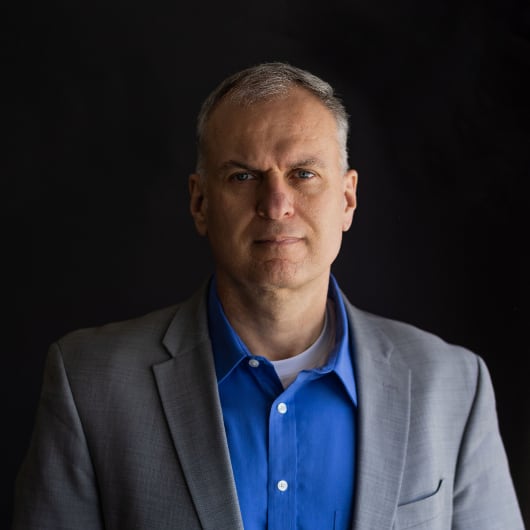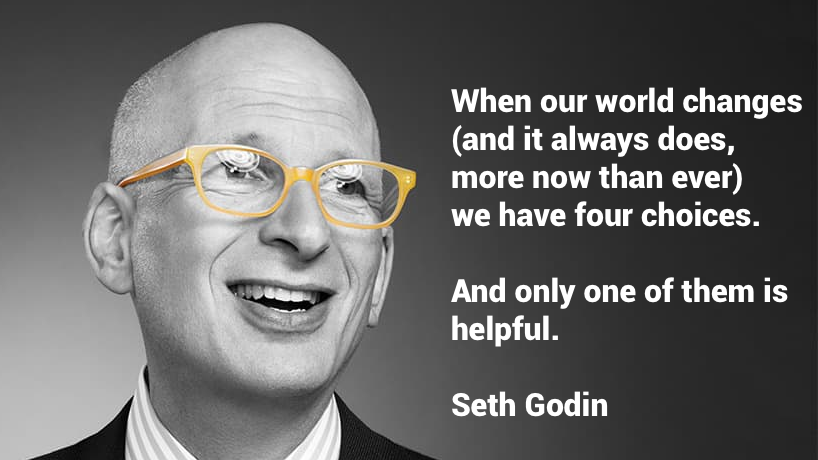Every Friday, we share interesting things we’ve read or seen that may have slipped past or been misinterpreted by most of the news.
This week, we will examine change and two perspectives on maintaining relevance and trustworthiness in a world that seems to be conspiring to undermine both.
1. Facing the future
Seth Godin writes this post (and they’re all this short) on how the internal story we tell ourselves and our organizations about tomorrow greatly affects our impact in our communities.
The Tofflers* explained that Future Shock kicks in when the world changes faster than we’re ready for. We react instead of respond, and often shut down in the face of too much of the new.
When our world changes (and it always does, more now than ever) we have four choices. And only one of them is helpful.
DENY: We can pretend that the world isn’t changing, that nothing is different and angrily push back on any evidence to the contrary. We can see the change as a personal affront, and insist that it’s not real or doesn’t matter.
GIVE UP: The contrary position is seductive as well. We can embrace our perceived powerlessness and simply stop trying.
CONTROL: While some understate their power, others overstate it. We can attempt to institute draconian measures, shortcut existing systems and demand that things go the way we want them to. You can hold back the ocean for a little while, but it always finds a way. It’s hard to make the tide against the law.
RESPOND: And this path is the resilient one, the one that not only makes it more likely we’ll achieve something but also engages us in productive work. Responders see and acknowledge the situation, then use their resources to make an impact. It never works out exactly the way we hope, but it usually works out better than any of the other paths.
*a reference to the 1970 book Future Shock by Alvin Toffler and his wife Adelaide Farrell
2. Burn the Playbooks
Pack McCormick presents a look at how the attempt to follow the shortcut and “best practice” can drain the unique and differentiated aspects out of our work.
There is a pattern that repeats itself over and over. Maybe it’s always been this way. I wasn’t alive always, so I don’t know. I know what it looks like today:
- Someone does something for love of the game or out of pure curiosity.
- They have success doing that thing.
- Others see the success, deconstruct how they did it.
- Others still repeat those same things, joylessly, without the original spark.
- Create a cheap shadow of the original.
I see this every day, in my particular line of work, every time a new startup hits my inbox promising to build X for Y but much better at Z in a $B market. Playing startup. Startup Mad Libs®. And I feel bad because you’re supposed to applaud the heroic effort required to start a startup, but a lot of these don’t feel heroic. They feel safe. And they feel doomed by that safety.
I bet you see it too, in yours.
Nothing great was ever created from a playbook. Playbooks are the death of creativity and joy.
This approach is increasingly leading to workflows that can replace human reasoning with AI-driven automation that is “good enough.”
AI won’t replace humans, or beat humans at what we do best, unless we turn ourselves into cheap AIs.
AI will do math tests better than we can.
AI will do reading comprehension tests better than we can.
AI will copy code better than we can.
AI will follow playbooks better than we can. Anything that we playbook becomes more legible to AI.
So we must burn the playbooks.
Both Godin and McCormick warn against a passive approach to a changing world. By combining a willingness to evolve with a commitment to our core values, community financial institutions can not only survive but thrive in this era of rapid change. The key lies in responding thoughtfully to new challenges, always keeping our unique strengths and community focus at the forefront of our strategies. It is alarming how many institutions see consolidation and growth as the only approach to competition and growing regulatory and compliance requirements. It is not only possible but likely necessary for the country’s continued economic health to have smaller, focused, and connected financial institutions uniquely serving the diverse needs of individuals and small businesses.
And that’s it for this Friday. Passing 20 years ago, the first celebrity chef, Julia Child, was also a pioneer in eco-friendly burials. Click below to let us know how we did:

